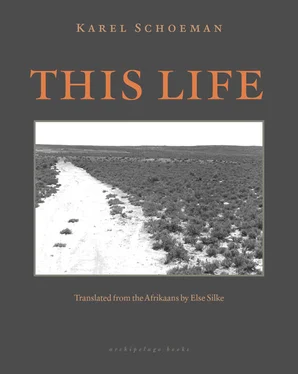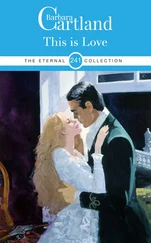Karel Schoeman - This Life
Здесь есть возможность читать онлайн «Karel Schoeman - This Life» весь текст электронной книги совершенно бесплатно (целиком полную версию без сокращений). В некоторых случаях можно слушать аудио, скачать через торрент в формате fb2 и присутствует краткое содержание. Год выпуска: 2015, ISBN: 2015, Издательство: Archipelago, Жанр: Современная проза, на английском языке. Описание произведения, (предисловие) а так же отзывы посетителей доступны на портале библиотеки ЛибКат.
- Название:This Life
- Автор:
- Издательство:Archipelago
- Жанр:
- Год:2015
- ISBN:978-0-914671-16-9
- Рейтинг книги:5 / 5. Голосов: 1
-
Избранное:Добавить в избранное
- Отзывы:
-
Ваша оценка:
- 100
- 1
- 2
- 3
- 4
- 5
This Life: краткое содержание, описание и аннотация
Предлагаем к чтению аннотацию, описание, краткое содержание или предисловие (зависит от того, что написал сам автор книги «This Life»). Если вы не нашли необходимую информацию о книге — напишите в комментариях, мы постараемся отыскать её.
considers both the past and future of the Afrikaner people through four generations of one family. In an elegiac narrator's tone, there is also a sense of compulsion in the narrator's attempts to understand the past and achieve reconciliation in the present. This Life is a powerful story partly of suffering and partly of reflection.
This Life — читать онлайн бесплатно полную книгу (весь текст) целиком
Ниже представлен текст книги, разбитый по страницам. Система сохранения места последней прочитанной страницы, позволяет с удобством читать онлайн бесплатно книгу «This Life», без необходимости каждый раз заново искать на чём Вы остановились. Поставьте закладку, и сможете в любой момент перейти на страницу, на которой закончили чтение.
Интервал:
Закладка:
We did not have many neighbours we could invite, here along the edge of the plateau in the sparsely populated Roggeveld with its scattered homesteads, but neighbourliness was neighbourliness, and those who were able to ride over, did so, amazed, uncertain and inquisitive about this sudden hospitality on our side; from Kanolfontein and Driefontein and Jakkalsfontein and Gunsfontein the people came, and their carts stood outspanned against the kraal wall. The house was filled with people and noise and activity, the golden glow of candlelight filled it; the women with their tiny glasses of sweet wine took their places on chairs against the walls of the voorhuis and outside in the dark one could hear the laughter of the men where they gathered around the brandy cask.
I remember Mother that evening, with shining eyes and a rare blush on her cheek-bones, rigid, tense and watchful, as if the arrival of the strangers posed a threat to her, and this rare show of friendship exposed her to danger, but nevertheless also proud of her home and the hospitality it could offer, so proud that, with all her strenuous efforts to be gracious and friendly, she was almost defiant towards her guests. I remember Mother, and Sofie in her glistening black gown, the focal point of that entire gathering, obscured for a moment as the candle-flames flickered in the draught or people moved past the light, but then glowing before my eyes once more in the diffused light. I noticed the mistrustful neighbours lined up against the wall studying her, and the jealousy of the country girls, huddling together shyly in their Sunday clothes; I saw the eyes of the men weighing her, though I did not recognise or understand that expression, and no matter how incomprehensible it has remained to me after all the years, I have seen it often enough since to know the words people use to describe it: wonder, admiration, lust and desire.
Jakob could not or would not dance, Blink Jakob, thickset, muscular and awkward — his thick neck I remember, and the broadcloth jacket stretched tight across his shoulders. Thus Jakob soon disappeared among the men around the brandy cask in the dark, and the young fellows were free to compete with each other for Sofie’s favour: the bashful, reticent farm lads, ill at ease in their Sunday best, the swaggering young men in their stiff collars and embroidered waistcoats, the unassuming and the bolder ones, the confident and the hesitant ones of our small world were crowding around her in the voorhuis. I sat on the floor in a corner, outside the circle of the candlelight, among the guests’ children in whom I took no interest and who, after their initial efforts to make friends had proved fruitless, had soon forgotten all about me. Gradually they became weary, however, and fell over where they were sitting or lying, but I stayed awake and observed, sleepless in the shadows, and heard the remarks the married women along the wall made amongst each other when Mother was not near, and the whispers of the girls crowding around the looking-glass in the bedroom by candlelight.
Without taking the least notice of Jakob’s absence, apparently even unaware of it, Sofie danced the night away, and as the other dancers grew tired and dropped out or went outside to where the brandy was, more and more often it was my brother Pieter who was her dancing partner, just as tireless as she was. I believe the farm lads of our district never really knew what to make of Pieter, but he was popular among the girls, with his quick tongue and nimble feet, his teasing manner, his agility and grace. Where, among us, had he ever got the opportunity to learn how to dance, I wonder now; but he could certainly dance, and well too, and all night long you saw his slender body moving among the dancers as if he could find no rest; later he took off his jacket and danced in his shirtsleeves, and more and more often it was Sofie that he chose as his partner. And why not? After all, they were the best dancers there. Pieter in his shirtsleeves and Sofie in her glistening gown of black satin, together in the fine haze of the dust stirred up by the feet of the dancers on the dung floor, in the golden glow of the tallow candles that lit up the room hazily, together, as in a dream, with the child in the corner watching and remembering, listening and remembering: the envy, the disapproval, the resentment, the spite, the desire that surrounded them, and the two young people together, as in a dream.
In the end I, too, fell asleep among the other children on the floor, and someone must have picked me up there and carried me to my room, for when I awoke I was lying on the little cot underneath the window, covered with a patchwork quilt, and strange children were sleeping in my own bed. It was the noise of gunshots that had awakened me, for it was dawn and outside the young men were welcoming the new year: I knelt on the cot, resting my elbows on the high window-sill, and looked out at the silver-grey morning, chilly and still as a pool. The shouting and shooting were distant and came from somewhere at the front of the house, but inside it had become silent, only the sound of a single violin lingered somewhere, persistent, languid and melancholy, as if the fiddler no longer knew how to finish the tune, and so just kept on playing in the dim light of dawn. He must have been sitting at the hearth in the kitchen with the servants, seeking out a little warmth against the chill of the morning; and in the empty yard Gert and Jacomyn were dancing together in the silver daylight to the rhythm of the thin, dreamy waltz.
Jacomyn — yes, I have not mentioned Jacomyn at all; but she came to us from the Karoo with Sofie; she followed Sofie as she climbed from the wagon when Jakob brought her to us as his bride, and Mother told Dulsie to take her to the kitchen. She was no more than a girl, only a few years older than Sofie herself, and her mother had been a slave in Sofie’s family in the old days, for Oom Wessel and his family were wealthy people, as I have said, who owned slaves just like Ouma’s people in the Bokkeveld; Jacomyn herself had still been born into slavery, and when the slaves were set free, she became Sofie’s personal maid and she came with her to the Roggeveld voluntarily when Sofie got married. She slept in the kitchen with old Dulsie, or sometimes on the rug before Sofie’s bed, and Mother kept her distance from her, just as she did from Sofie herself, while she, on the other hand, treated us with aloofness and was usually withdrawn and sullen in our company. Only towards Gert did she show a certain ambivalence, and after her arrival he hung around the kitchen far more often, so that Mother had to chase him away and even Father had to admonish him on occasion. With Jacomyn, a further element of division of which I became increasingly aware during that time was introduced into our already divided little world, for Dulsie reacted to the intruder with immediate animosity, complained endlessly to Mother about her doings, referred to her scornfully as a Slamaaiermeid and maintained she practised magic, while Jacomyn berated her as a Hotnot, and treated her with insolent indifference.
What was the cause of the division in our family, in our home, on our farm — brother against brother, parent against child, master against servant and servants among themselves; whence came the animosity, dissension and spite? We lived together in the same house, shared the same yard, worked together on the same land, met with the same predicaments and faced the same threats and dangers, inescapably dependent upon each other on those barren heights, inextricably connected in our isolation, and nonetheless irrevocably divided, with no hope that the rift would ever be healed. Nine people in the same house and on the same farm, bending over the same task, working together shoulder to shoulder, and yet we never really got to know each other, or made any real effort to get closer, but just brushed past each other in our daily lives, and gradually the abrasions developed into festering wounds. Only in the evenings during family worship did we all come together to unite in the apparent solidarity of a common activity; or at least we gathered in the same room, family members around the large table in the voorhuis and servants to one side in the corner by the kitchen door while Father read aloud from the Bible and led us in prayer. Together — yes, only apparently so, for were we united even within the walls of that single room? How much did Father understand of that text he followed with his finger, word for word, head inclined towards the candle-flame, those words of admonition or judgement, of love or absolution, trivialised into a mere low-pitched monotone; how much of it did any of us hear, understand, take in? While he was praying I studied the people around me from behind my entwined fingers, my own family around the table in the uncertain light of the candle, Father, Mother, Jakob, Pieter and Sofie, and in the floating, fluid shadows along the wall the vaguer outlines of the servants, Dulsie, Jacomyn and Gert.
Читать дальшеИнтервал:
Закладка:
Похожие книги на «This Life»
Представляем Вашему вниманию похожие книги на «This Life» списком для выбора. Мы отобрали схожую по названию и смыслу литературу в надежде предоставить читателям больше вариантов отыскать новые, интересные, ещё непрочитанные произведения.
Обсуждение, отзывы о книге «This Life» и просто собственные мнения читателей. Оставьте ваши комментарии, напишите, что Вы думаете о произведении, его смысле или главных героях. Укажите что конкретно понравилось, а что нет, и почему Вы так считаете.












